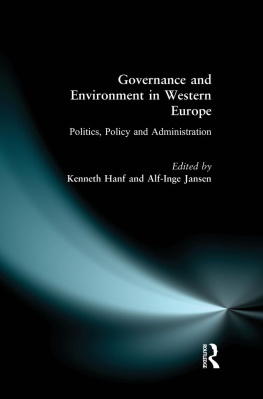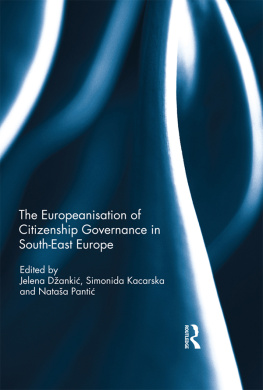THE POLITICS OF SCALE IN POLICY
Scalecraft and education governance
Natalie Papanastasiou
First published in Great Britain in 2019 by
Policy Press | North America office: |
University of Bristol | Policy Press |
1-9 Old Park Hill | c/o The University of Chicago Press |
Bristol | 1427 East 60th Street |
BS2 8BB | Chicago, IL 60637, USA |
UK | t: +1 773 702 7700 |
t: +44 (0)117 954 5940 | f: +1 773-702-9756 |
pp-info@bristol.ac.uk | sales@press.uchicago.edu |
www.policypress.co.uk | www.press.uchicago.edu |
Policy Press 2019
British Library Cataloguing in Publication Data
A catalogue record for this book is available from the British Library
Library of Congress Cataloging-in-Publication Data
A catalog record for this book has been requested
ISBN 978-1-4473-4385-1 hardcover
ISBN 978-1-4473-4387-5 ePub
ISBN 978-1-4473-4388-2 Mobi
ISBN 978-1-4473-4386-8 ePdf
The right of Natalie Papanastasiou to be identified as author of this work has been asserted by her in accordance with the Copyright, Designs and Patents Act 1988.
All rights reserved: no part of this publication may be reproduced, stored in a retrieval system, or transmitted in any form or by any means, electronic, mechanical, photocopying, recording, or otherwise without the prior permission of Policy Press.
The statements and opinions contained within this publication are solely those of the author and not of the University of Bristol or Policy Press. The University of Bristol and Policy Press disclaim responsibility for any injury to persons or property resulting from any material published in this publication.
Policy Press works to counter discrimination on grounds of gender, race, disability, age and sexuality.
Cover design by Clifford Hayes
Front cover image: iStock
Contents
Natalie Papanastasiou is a postdoctoral researcher of public policy and governance. Her research interests focus on the practices of policymaking and the politics of education governance, which she explores by drawing on theories from policy studies, political geography and public administration. Her work has been published in journals that include Public Administration, Journal of Education Policy, Critical Policy Studies and Environment and Planning A, and she has secured competitive research grants from the UK Economic and Social Research Council, the Leverhulme Trust, and the Spanish Ministry of Economy and Competitiveness. She is currently based in the Globalisation, Education, and Social Policies (GEPS) research group at the Universitat Autnoma de Barcelonas Department of Sociology.
This book presents a long overdue encounter between policy studies and critical work on questions of scale (from geographers, anthropologists, political sociologists and others). Scale, as Natalie Papanastasiou argues compellingly, is central to the political and intellectual landscape of policy studies. It is present everywhere and almost always taken for granted as the terrain on which policy takes place whether that be the role of global organisations (such as the World Bank or the International Monetary Fund) in shaping policy or the local as the site of policy implementation (where the front line worker meets the service user). Between these two levels is the apparently fixed point of the nation the place where policy and politics meet, in the offices, corridors, debating chambers and legal drafting departments of the nation-state.
Both space and scale matter for policy and policy studies. It has taken a long time to loosen the grip of methodological nationalism on policy studies which has conventionally treated policies as exclusively national phenomena, attached to a particular place and polity, and being devised, directed and enacted by a nation-state. Such a view enabled a comparative studies approach centred on looking for the similarities and differences between national systems (and attending to their evolution through time). However, this conception of the national space of policy has been increasingly challenged and there has been a growing attention to new domains and dynamics of policy, in particular, those associated with perceived processes of globalisation, regionalisation and Europeanisation. These processes are understood to have unsettled the assumed unities of place, people and policy associated with methodological nationalism. At times, there has been a risk of substituting a methodological globalism in its place, projecting a flat world of policy travel and transfer. What is more important, however, is that much of this emerging scholarship has been framed by a taken for granted conception of the scales or levels at which policy comes into being the local, national, European, global and so on.
This book takes on this scalar framing directly and aims to enhance and deepen the work of critical and interpretive policy studies, not least by inciting a conversation with critical geographers and others. Critical geographers have done those of us working in policy studies a great favour by undoing such ways of thinking about space and scale both conceptually and politically. For me, my former colleague Doreen Massey (of place. For example, in an interview with Andrew Stevens, she gave a crisply compressed version of her view of the relational character of place making:
For me, places are articulations of natural and social relations, relations that are not fully contained within the place itself. So, first, places are not closed or bounded which, politically, lays the ground for critiques of exclusivity. Second, places are not given they are always in open-ended process. They are in that sense events. Third, they and their identity will always be contested (we could almost talk about local-level struggles for hegemony). (Massey, nd)
Scale, too, however, is relationally constituted even as specific scalar orderings aspire to be seen as natural and normal. My first practical encounter with the problem of scale came at a long-ago workshop comparing local government in the UK and Germany. The event was supposed to be a classic academic comparison of organisation of government in the two countries. However, the plan came unravelled when it became uncomfortably clear that the local was not referring to the same thing in the two countries. So we had a different comparison on our hands: how were both space and scale being made up in the government systems of these two places the territory, its relationship with other scales of government, its imagined relationship to the population and more. Scale or more precisely what Engin Isin () called scalar thinking proved profoundly unreliable and unhelpful in this case. It has continued to be so in a variety of forms, whether in the strange juxtapositions of levels (the local and the global) or trying to map scalar hierarchies (as in the idea of multi-level governance). Scale is made up both in the sense of being imagined or invented and in the sense of being assembled or composed.
This question of the local is central to this books exploration of the relationships between scale and policy. In , Natalie Papanastasiou explores the local in its different incarnations, institutionalisations and inflections. Her tracing of the shifting construction of the local in English education policy (away from its old association with the local authority) through a new political drive for localism illuminates just how scale can be effectively re-imagined and reveals the links between what she calls statecracft and scalecraft.














